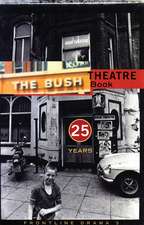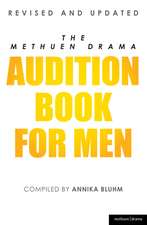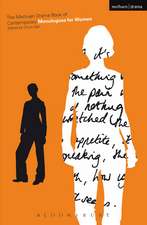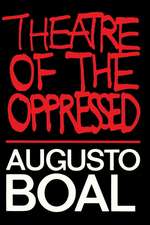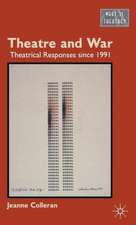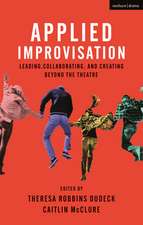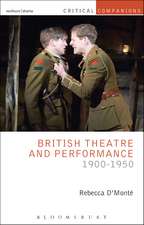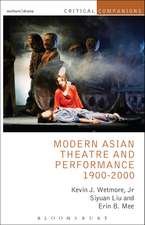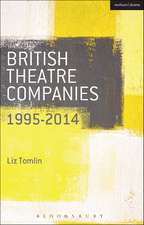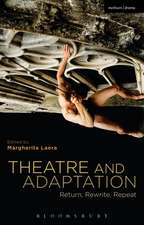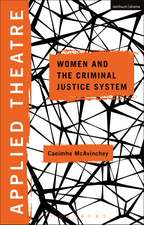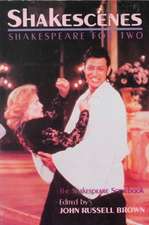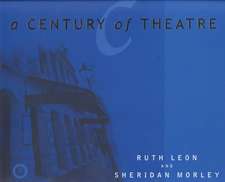Keith Johnstone: A Critical Biography
Autor Theresa Robbins Dudecken Limba Engleză Paperback – 14 aug 2013
Preț: 159.99 lei
Preț vechi: 210.99 lei
-24% Nou
Puncte Express: 240
Preț estimativ în valută:
30.61€ • 32.03$ • 25.43£
30.61€ • 32.03$ • 25.43£
Carte tipărită la comandă
Livrare economică 03-17 aprilie
Preluare comenzi: 021 569.72.76
Specificații
ISBN-13: 9781408183274
ISBN-10: 1408183277
Pagini: 232
Ilustrații: 47 halftones
Dimensiuni: 156 x 234 x 18 mm
Greutate: 0.36 kg
Editura: Bloomsbury Publishing
Colecția Methuen Drama
Locul publicării:London, United Kingdom
ISBN-10: 1408183277
Pagini: 232
Ilustrații: 47 halftones
Dimensiuni: 156 x 234 x 18 mm
Greutate: 0.36 kg
Editura: Bloomsbury Publishing
Colecția Methuen Drama
Locul publicării:London, United Kingdom
Caracteristici
The first critical study of one of the most influential theatre practioners of modern times
Notă biografică
Theresa Robbins Dudeck, Ph.D., is an experienced teacher/practitioner of Keith Johnstone's Impro System and of acting, voice, and applied theatre techniques. She directs, teaches, and performs in both professional and academic settings. As Johnstone's Literary Executor, she continues to organize, document, and preserve his archive for future scholarship. Theresa lives in Los Angeles.
Cuprins
1 Introducing Keith Johnstone and his Impro System2 The formative yearsFirst forays in teachingWaiting for GodotThe Royal Court Theatre - A 'School' for playwrightsSamuel Beckett - An arranged meetingSunday Night productions without décorThe Writers' GroupEleven Men Dead at Hola Camp - An improvised dramatic protestJohnstone as a Royal Court Theatre directorCourt politicsThe Knack3 All the world is a classroomThe Royal Court Theatre StudioClowningJohnstone's last season at the Royal CourtThe Performing GiantThe Royal Academy of Dramatic ArtsThe Theatre MachineJohnstone teaches beyond BritainTheatre Machine back at the Court and Johnstone's courtshipJohnstone and Eugenio BarbaThe Last Bird in CopenhagenEmigration4 The master teacher in the university classroomO Canada! Johnstone's new homJohnstone's first staging of GodotThe University of CalgaryDrama 200 and Drama 300Vakhtangov and ZenTeacher-student interactionProduction work at the University of CalgaryLive Snakes and LaddersJohnstone's legacy at the University of Calgary5 From classroom to world stage: The Loose Moose Theatre CompanyThe Loose Moose Theatre CompanyBeginning of TheatresportsWaiting for Godot and The Last Bird againTheatresports Tournaments and The Loose Moose HamletLoose Moose finds a homeA Pinteresque seasonBustling and brokeUnsportsmanlike conductLoose Moose moves forwardImpro and Theatresports in SwedenFestival of Fools in New York and treated like fools in QuebecBack homeBeginning of Life Game and other formatsOut of debt but no recognition(Re)Teaching TheatresportsConflict and closure - Beyond and within; TransitionsThe Loose Moose today6 What now? What comes next? What classrooms still remain?Johnstone - The reluctant guruJohnstone's international workshops - Ideal for who?What may (or may not) happen in a Johnstone workshopImprobable's Life Game and Rebecca Northan's Blind DateImpro hot on stages and in classrooms of Latin AmericaImpro beyond the theatre classroomWhat comes next? What classrooms still remain?BibliographyIndex
Recenzii
The book succeeds as an illuminating companion to Johnstone's writing and for anyone who wants to add to their understanding of how to improvise ... This is a living history and one which is required reading for anyone who has ever improvised and wants to know the pedagogical philosophy and principles ... An invaluable and inspiring insight into the influences and experiences that have shaped an unsung genius of twentieth-century theatre
[Dudeck's] aim of balancing scholarship with accessibility is ably achieved in this unsentimental critical biography that greatly enriches our understanding of the system, and its enigmatic creator and, crucially, the pedagogic principles that drive both.
As a whole, Dudeck's biography provides a balanced and thorough critique of one of the most under-recognized theatre practitioners of the twentieth century. Ideal for both Impro veterans and novices of spontaneity, this text will serve as an infinitely useful supplement to Johnstone's own texts and other historical accounts of improvisational theory and practice.
Keith Johnstone has unlocked the potential for human creativity more than anyone else that I've encountered. And his ideas are still a radical challenge to what it means to educate or be educated. So it's great to finally have a book that lays out Keith's ideas and puts them in the context of his life and times. Essential reading for artists, teachers or anyone who wants to be more fully alive.
Chronicling the mind and works of one of the great teachers of our age is no small task. Prof. Dudeck has given us a window into the world of Keith Johnstone's life and pedagogy. Attending Keith's workshops opened new vistas in social psychology for me decades ago . . . and his original views on status have become foundational ideas in the social sciences. I rejoice that readers of all ages can now stand in his classroom.
Keith Johnstone is so off-the-charts original and creative it's hard to express. He taught me more about secret human behaviors, status transactions, and how to employ them in my work than any other person in my life, with startling results. This book is a noteworthy contribution to the knowledge of this rare and wonderful man and is to be snatched up and digested immediately!
Whether it's devising with Improbable, improvising with the Comedy Store Players, or directing at the Metropolitan Opera, every aspect of my work is profoundly influenced by Keith Johnstone's teaching. In this book, Dudeck offers a frank, inspiring account of Keith's path, articulates the deeply held passions at the centre of his methodology, and situates Keith and his work in its proper place: at the heart and creative wellspring of modern theatre.
[Dudeck's] aim of balancing scholarship with accessibility is ably achieved in this unsentimental critical biography that greatly enriches our understanding of the system, and its enigmatic creator and, crucially, the pedagogic principles that drive both.
As a whole, Dudeck's biography provides a balanced and thorough critique of one of the most under-recognized theatre practitioners of the twentieth century. Ideal for both Impro veterans and novices of spontaneity, this text will serve as an infinitely useful supplement to Johnstone's own texts and other historical accounts of improvisational theory and practice.
Keith Johnstone has unlocked the potential for human creativity more than anyone else that I've encountered. And his ideas are still a radical challenge to what it means to educate or be educated. So it's great to finally have a book that lays out Keith's ideas and puts them in the context of his life and times. Essential reading for artists, teachers or anyone who wants to be more fully alive.
Chronicling the mind and works of one of the great teachers of our age is no small task. Prof. Dudeck has given us a window into the world of Keith Johnstone's life and pedagogy. Attending Keith's workshops opened new vistas in social psychology for me decades ago . . . and his original views on status have become foundational ideas in the social sciences. I rejoice that readers of all ages can now stand in his classroom.
Keith Johnstone is so off-the-charts original and creative it's hard to express. He taught me more about secret human behaviors, status transactions, and how to employ them in my work than any other person in my life, with startling results. This book is a noteworthy contribution to the knowledge of this rare and wonderful man and is to be snatched up and digested immediately!
Whether it's devising with Improbable, improvising with the Comedy Store Players, or directing at the Metropolitan Opera, every aspect of my work is profoundly influenced by Keith Johnstone's teaching. In this book, Dudeck offers a frank, inspiring account of Keith's path, articulates the deeply held passions at the centre of his methodology, and situates Keith and his work in its proper place: at the heart and creative wellspring of modern theatre.


